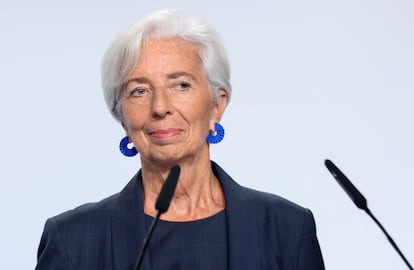Lagarde: From negative rates to a heavy hand in just the first half of her term as president of the European Central Bank
The Frenchwoman has reached the middle of her presidency after carrying out the largest rate increase in history and making some errors in communication

Christine Lagarde says she still treasures the breathing techniques she acquired as a young woman, during her time as a professional swimmer in France. The president of the European Central Bank (ECB) must have had to use them on more than one occasion in the last four years. In that period of time, she has been forced to go from one extreme to the other: from an ultra-expansive policy to save Europe from the pandemic to quickly pulling out all the stops and executing the largest rate hike in the history of the ECB. Lagarde will pass the halfway point of her eight-year mandate this Wednesday. It is a leadership that has not been without criticism, some of which she has accepted. But when asked about her presidency, she refers to what Edith Piaf intoned: “Non, je ne regrette rien.” In other words, she regrets nothing.
Lagarde became president of the ECB after a very long European summit in July 2019, in which high-level agreements left the German Jens Weidmann, who had been nominated for the position, definitively out of the race. Lagarde, still managing director of the International Monetary Fund (IMF) at the time, had denied her willingness to take the position on many occasions. However, France’s interest in that chair and the Frenchwoman’s proximity to then-Chancellor Angela Merkel made her the ideal person to take the reins of the highest monetary authority in the eurozone. The entry of the German Ursula von der Leyen into the equation confirmed her arrival in Frankfurt as someone who had already established herself as one of the most powerful women in the world, capable of breaking several glass ceilings. In her career so far she has been the first woman to head Baker & Mackenzie’s Global Strategic Committee, the first woman to be Finance Minister of France, the first woman to be managing director of the IMF and, finally, the first female president of the ECB.
Lagarde had the difficult task of succeeding the all-powerful Mario Draghi, a renowned economist who amply demonstrated his ability to convince, and even dominate, the markets with just three words: “Whatever it takes.” The main criticisms, behind which Lagarde has sometimes seen a certain level of misogyny, refer to the fact that she is not an economist and comes from the world of politics. Several sources emphasize this lack of a financial background, which they project on to its vice president, Luis de Guindos, former Spanish Minister of Economy, despite the fact that the latter is an economist by training. “Before, there was a much more technical profile, with the Draghi and Vítor Constancio duo at the head of the institution,” says Alessandro Merli, member of the Johns Hopkins University SAIS Europe.
This newspaper has spoken with several sources, who agree that Draghi was quickly able to make an interpretation of the data provided by the economists, from which the ECB could come up with a proposal for action. Lagarde has had to rely on other council members. According to these sources, she did it with the Irishman Philip Lane, first, and later with the German Isabel Schnabel. And Lagarde’s non-technical profile supports criticism of the ECB’s late reaction to rampant inflation — despite the difficulty of predicting a war in Ukraine — and the danger of having overreacted. “The ECB was slow to raise interest rates at first. Then, it carried out a series of unprecedented moves. But monetary policy is transferred to the economy with a delay, which could cause a greater deterioration in the economy than desired,” adds Merli.
Lagarde admitted in an interview with Financial Times that the Eurobank should have acted sooner. “I should have been bolder,” she confessed. ECB economists, in fact, have publicly issued a mea culpa for having considered that inflation was going to be a temporary phenomenon. Many analysts see a parallel here with what happened in 2013 at the IMF. Then, its chief economist, Olivier Blanchard, admitted that the recommendations made by the institution at the beginning of the European crisis were based on calculations that underestimated the depressive impact of austerity. On the other hand, Lagarde’s entourage rejects the notion that the ECB might have gone too far in raising rates. “The latest inflation figures from the eurozone are good. They are in line with what was expected, and the economy follows the soft landing script,” they maintain.
Ability to dialogue
The ECB president has, however, been able to make a virtue of necessity and transform her need for technical support into a relationship of greater trust with the bank’s governing council. When she landed in Frankfurt, she found that the body was practically in rebellion. After eight years of dominance of the low interest rate, low unemployment mindset — known as “doves” — hardline “hawks” were demanding an end to the ultra-expansive policy. Lagarde, who stands out for her political and diplomatic ability, has known how to rely on the members of the council to make her decisions, until she has built a consensus. In fact, the decision to stop the rate increases at the last conclave was adopted unanimously. “While we disagree on occasion, […] we have a quality of debates, of exchanges, of different views, we try to convince each other on occasions, and we, sometimes, manage; that is something that has to be cherished and, in a world where, for dissenting opinions, people go into nonconsensual and irrational directions, it is a gem,” Lagarde highlighted about her first half-term in office at the ECB.
On paper, one of Lagarde’s strengths had to be her great communication skills. And for the most part, that’s how it has been. The Frenchwoman, who locks herself away the weekends before the councils in order to be prepared, knows how to deal with journalists and analysts, dispense with papers and adapt famous quotes to reinforce her speeches — ”The lady isn’t tapering,” she once said, paraphrasing Margaret Thatcher. In a short time, she has managed to embody an institution. However, she has also made serious communication errors. The main one occurred right at the beginning of the pandemic. Then, she inflamed the markets with a disappointing message. “We are not here to close risk premiums,” she stated, unleashing panic over another debt crisis. “Lagarde has been unlucky on several occasions. On that occasion, it caused a crisis that later had to be resolved with another program of massive debt purchases,” says José Carlos Díaz, professor at the University of Alcalá (Spain).
Lagarde faces her second part of her mandate with enormous noise about her future. Her name is heard most loudly with regard to future French presidential elections, in which a political figure capable of stopping the extreme right will be required again, although there are those who even believe that she could play some kind of role in the 2024 European elections. For now, the Frenchwoman says she remains focused on the bank’s main mission, which is to return inflation to its 2% objective without putting the financial stability of the Old Continent at risk. This week’s inflation data will surely have released some pressure.
Sign up for our weekly newsletter to get more English-language news coverage from EL PAÍS USA Edition
Tu suscripción se está usando en otro dispositivo
¿Quieres añadir otro usuario a tu suscripción?
Si continúas leyendo en este dispositivo, no se podrá leer en el otro.
FlechaTu suscripción se está usando en otro dispositivo y solo puedes acceder a EL PAÍS desde un dispositivo a la vez.
Si quieres compartir tu cuenta, cambia tu suscripción a la modalidad Premium, así podrás añadir otro usuario. Cada uno accederá con su propia cuenta de email, lo que os permitirá personalizar vuestra experiencia en EL PAÍS.
¿Tienes una suscripción de empresa? Accede aquí para contratar más cuentas.
En el caso de no saber quién está usando tu cuenta, te recomendamos cambiar tu contraseña aquí.
Si decides continuar compartiendo tu cuenta, este mensaje se mostrará en tu dispositivo y en el de la otra persona que está usando tu cuenta de forma indefinida, afectando a tu experiencia de lectura. Puedes consultar aquí los términos y condiciones de la suscripción digital.









































